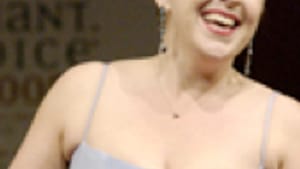Stay in the Loop
BSR publishes on a weekly schedule, with an email newsletter every Wednesday and Thursday morning. There’s no paywall, and subscribing is always free.
Lyric Fest: Philadelphia composers

Philadelphia songwriters? Who knew?
TOM PURDOM
Death being then the condition of life, we cannot love to live, if we cannot bear to die.
William Penn said that, as you may be aware. It’s part of his famous “Evidence of Things Unseen” statement. Composer Ned Rorem set the complete statement to music, in a four-voice arrangement that plays as if it could have been devised for a church service.
Lyric Fest included Rorem’s little gem in a program devoted to music by composers who spent part of their lives in Philadelphia, and it was only one entry in a long list of surprises. The Lyric Fest song programs usually resemble variety shows, but this one was in a class by itself, with 28 items by 22 composers.
The most consistently enjoyable music series in the city at the present moment are Lyric Fest and Mimi Stillman’s Dolce Suono chamber programs. They’re both bargains, too— Lyric Fest at 20 contemporary dollars, Dolce Suono gratis.
A little nonsense
For many (perhaps most) concertgoers, an art song recital consists of someone singing genteel 19th-Century odes in a foreign language. If that’s your picture of the genre, Lyric Fest’s programs will soon disabuse you.
The comedy acts in this show, for example, included baritone Markus Beam singing Marc Blitzstein’s 1920s ode about a young man’s lust for an elegant suit equipped with that newly-invented wonder, the zipper fly. Lee Hoiby’s setting of Lewis Carroll’s Jabberwocky raised another series of laughs, partly because soprano Megan Dey-Toth performed it deadpan, as if it were a serious epic. Beam and soprano Jennifer Aylmer, a natural comedian, staged a complete Broadway vignette as they acted out Bernstein’s hilarious Carried Away (presumably included by virtue of Bernstein’s stint as a Curtis student), lyrics by Comden and Green.
The serious moments, on the other hand, included powerful bits like Randi Marrazzo’s passionate re-enactment of a psychotic’s descent into hell, music by Margaret Garwood, lyrics from Eithne Tabor’s autobiographical poetry collection Songs of a Psychotic.
Crumb’s piano tricks
The oldest entry was an ode by a signer of the Declaration of Independence, Francis Hopkinson, sung by the Pennsylvania Girlchoir. The most avant-garde, stylistically, was George Crumb’s setting of Walt Whitman’s The Night is Silence, beautifully sung by Suzanne DuPlantis, with Laura Ward gamely working with Crumb’s tricks with the amplified piano.
Nothing’s perfect, of course. In two or three cases, the songs and the singers didn’t quite match. A setting of a Sara Teasdale poem over-elaborated some of Teasdale’s lines. But Lyric Fest’s programs enjoy the great advantage that no item lasts more than four or five minutes. If you don’t like the current turn, something else will soon replace it. And there’s a very high probability the replacement will be amusing, moving or even thought-provoking.
TOM PURDOM
Death being then the condition of life, we cannot love to live, if we cannot bear to die.
William Penn said that, as you may be aware. It’s part of his famous “Evidence of Things Unseen” statement. Composer Ned Rorem set the complete statement to music, in a four-voice arrangement that plays as if it could have been devised for a church service.
Lyric Fest included Rorem’s little gem in a program devoted to music by composers who spent part of their lives in Philadelphia, and it was only one entry in a long list of surprises. The Lyric Fest song programs usually resemble variety shows, but this one was in a class by itself, with 28 items by 22 composers.
The most consistently enjoyable music series in the city at the present moment are Lyric Fest and Mimi Stillman’s Dolce Suono chamber programs. They’re both bargains, too— Lyric Fest at 20 contemporary dollars, Dolce Suono gratis.
A little nonsense
For many (perhaps most) concertgoers, an art song recital consists of someone singing genteel 19th-Century odes in a foreign language. If that’s your picture of the genre, Lyric Fest’s programs will soon disabuse you.
The comedy acts in this show, for example, included baritone Markus Beam singing Marc Blitzstein’s 1920s ode about a young man’s lust for an elegant suit equipped with that newly-invented wonder, the zipper fly. Lee Hoiby’s setting of Lewis Carroll’s Jabberwocky raised another series of laughs, partly because soprano Megan Dey-Toth performed it deadpan, as if it were a serious epic. Beam and soprano Jennifer Aylmer, a natural comedian, staged a complete Broadway vignette as they acted out Bernstein’s hilarious Carried Away (presumably included by virtue of Bernstein’s stint as a Curtis student), lyrics by Comden and Green.
The serious moments, on the other hand, included powerful bits like Randi Marrazzo’s passionate re-enactment of a psychotic’s descent into hell, music by Margaret Garwood, lyrics from Eithne Tabor’s autobiographical poetry collection Songs of a Psychotic.
Crumb’s piano tricks
The oldest entry was an ode by a signer of the Declaration of Independence, Francis Hopkinson, sung by the Pennsylvania Girlchoir. The most avant-garde, stylistically, was George Crumb’s setting of Walt Whitman’s The Night is Silence, beautifully sung by Suzanne DuPlantis, with Laura Ward gamely working with Crumb’s tricks with the amplified piano.
Nothing’s perfect, of course. In two or three cases, the songs and the singers didn’t quite match. A setting of a Sara Teasdale poem over-elaborated some of Teasdale’s lines. But Lyric Fest’s programs enjoy the great advantage that no item lasts more than four or five minutes. If you don’t like the current turn, something else will soon replace it. And there’s a very high probability the replacement will be amusing, moving or even thought-provoking.
Sign up for our newsletter
All of the week's new articles, all in one place. Sign up for the free weekly BSR newsletters, and don't miss a conversation.

 Tom Purdom
Tom Purdom